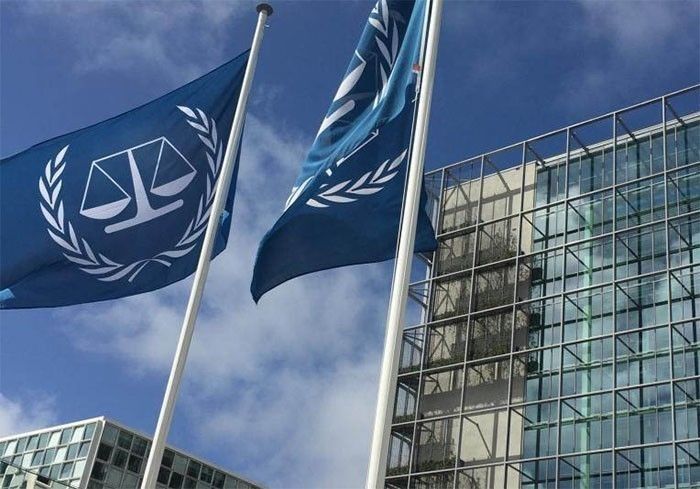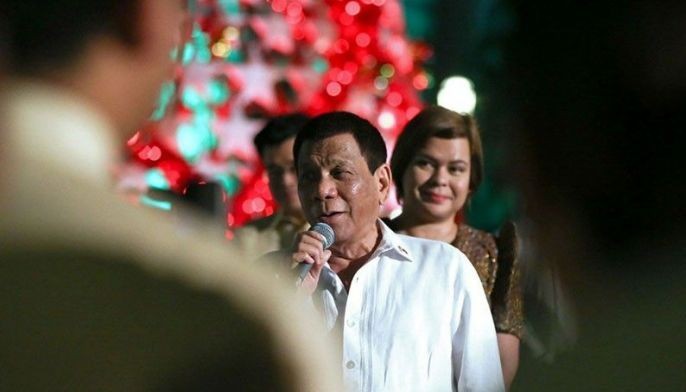SC: Pleas vs ICC withdrawal moot; petitioners have no legal standing to sue

MANILA, Philippines — Senators, the Philippine Coalition for International Criminal Court and the Integrated Bar of the Philippines lacked the legal standing to question the government’s withdrawal from the Rome Statute, the Supreme Court said.
Voting unanimously, the SC, in a ruling penned by Associate Justice Marvic Leonen, dismissed the three consolidated petitions questioning the Philippine government’s unilateral departure from the ICC due to mootness.
It held: “The president, as primary architect of our foreign policy and as head of state, is allowed by the Constitution to make preliminary determinations on what, at any given moment, might urgently be required in order that our foreign policy may manifest our national interest.”
“Absent a clear and convincing showing of a breach of the Constitution or a law, brought through an actual, live controversy and by a party that presents direct, material, and substantial injury as a result of such breach, this Court will stay its hand in declaring a diplomatic act as unconstitutional,” the SC said.
President Rodrigo Duterte cited “outrageous” attacks on him and his administration and the supposedly illegal attempt by then-ICC prosecutor Fatou Bensouda to place him under the Hague-based court’s jurisdiction as reasons for the country’s withdrawal. His announcement came a month after the ICC initiated a preliminary examination into allegations of extrajudicial killings in the Philippines.
The petitioners ran to the SC and sought to have the withdrawal declared invalid or ineffective for lack of concurrence from at least two-thirds of the members of the Senate. The withdrawal from the ICC took effect on March 17, 2019, making the Philippines the second country to leave the Hague-based tribunal to prosecute the world’s worst atrocities.
The SC, in its ruling made public only on Wednesday, said: “The Petitions here raise interesting legal questions. However, the factual backdrop of these consolidated cases renders inopportune a ruling on the issues presented to this Court.”
Legal standing and transcendental importance
The SC stressed that it may only rule “in an appropriate, justiciable controversy raised by a party who suffers from direct, substantial, and material injury.”
On the part of senators, the SC pointed out that they had not passed a resolution indicating that assent should be obtained before withdrawing from the Rome Stature.
“Such reticence on this matter means that, as a collegial body, and in its wisdom, the Senate has chosen not to assert any right or prerogative which it may feel pertains to it, if any, to limit, balance, or otherwise inhibit the President’s act,” the SC added.
On the PCICC and IBP, the SC noted that persons invoking their rights as citizens must meet the following requisites:
- They must have "personally suffered some actual or threatened injury as a result of the allegedly illegal conduct of the government"
- "the injury is fairly traceable to the challenged action"
- "the injury is likely to be redressed by a favorable action"
But the PCICC and IBP failed to show actual or imminent injury they sustained from the government’s withdrawal from the ICC, the SC said. They also do not have standing as taxpayers as they failed to show any illegal expenditure of public funds.
The SC had allowed associations to file on behalf of their members, but in the case of the PCICC and IBP, the SC said they failed to convince the Court why they must be heard as groups.
“Advocating human rights as an institution is insufficient. No special reason was alleged, let alone proved, why its allegedly injured members may not file the case themselves,” it added.
The SC also noted that the petitions raised transcendental importance but “none of the exceptional conditions warranting the exercise of this Court’s jurisdiction is present here.”
The high court stressed that the transcendental importance of issues excusing standing must be justified only in extraordinary circumstances.
“The alleged transcendental importance of the issues raised here will be better served when there are actual cases with the proper parties suffering an actual or imminent injury. No injury so great and so imminent was shown here, such that this Court cannot instead adjudicate on the occasion of an appropriate case,” it added.
Mootness and guidelines on evaluating cases involving president’s withdrawal
The court also said when the Philippines submitted a Note Verbale on our departure to the United Nations Secretary General’s Chef de Cabinet on March 16, which was received the following day, the country “completed the requisite acts of withdrawal.”
It added that the ICC acknowledge the Philippines’ action. “The Petitions were, therefore, moot when they were filed,” the SC said.
The high court also pointed out that the ICC’s announcement of the Philippines departure from the Rome Statute “settles any doubt on whether there are lingering factual occurrences that may be adjudicated.”
“No longer is there an unsettled incident demanding resolution. Any discussion on the Philippines’ withdrawal is, at his juncture, merely a matter of theory,” it added.
The court also pointed out that the ICC also stressed that the Philippines’ withdrawal from the Rome Statute has no impact on any pending proceedings.
“At that point, this Court’s interference and ruling on what course of action to take would mean an imposition of its will not only on the executive, but also on the [ICC] itself,” the SC said, adding that it cannot “encroach on matters beyond its jurisdiction.”
The SC then listed the following guidelines for “evaluating cases concerning the president’s withdrawal from international agreements:”
- First, the president enjoys some leeway in withdrawing from agreements which he or she determines to be contrary to the Constitution or statutes.
- Second, the president cannot unilaterally withdraw from agreements which were entered into pursuant to congressional imprimatur
- Third, the president cannot unilaterally withdraw from international agreements where the senate concurred and expressly declared that any withdrawal must also be made with its concurrence.
The SC held: “All told, the consolidated Petitions are dismissed for failing to demonstrate justifiability.”
“While we commend the zealousness of petitioners in seeking to ensure that the President acts within the bounds of the Constitution, they had no standing to file their suits. We cannot grant the reliefs they seek,” it added.
- Latest
- Trending


































